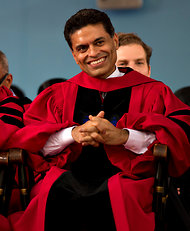 Steven Senne/Associated PressFareed Zakaria in May at Harvard University, where he received an honorary degree.
Steven Senne/Associated PressFareed Zakaria in May at Harvard University, where he received an honorary degree.
8:21 p.m. | Updated
Time magazine and CNN suspended Fareed Zakaria, the writer and television host, on Friday after he apologized for plagiarizing a New Yorker article in his column on gun control in the Aug. 20 issue of Time.
Some passages in Mr. Zakaria’s column, “The Case for Gun Control,” closely tracked those in a longer article on guns in America by the historian Jill Lepore, which appeared in the April 23 issue of The New Yorker.
The similarities in the texts were spotted by the conservative Web site NewsBusters, and quickly spread across the Internet after appearing on the media blog JimRomenesko.com.
Mr. Zakaria issued a statement Friday afternoon saying: “Media reporters have pointed out that paragraphs in my Time column this week bear close similarities to paragraphs in Jill Lepore’s essay in the April 23 issue of The New Yorker. They are right. I made a terrible mistake. It is a serious lapse and one that is entirely my fault. I apologize unreservedly to her, to my editors at Time, and to my readers.”
His admission is the second instance in less than two weeks of a prominent writer owning up to an ethical lapse. Last week, the science writer Jonah Lehrer admitted that he fabricated quotes from Bob Dylan for his best-selling book “Imagine: How Creativity Works.” Mr. Lehrer was forced to resign as a staff writer for The New Yorker, and his publisher, Houghton Mifflin Harcourt, said it would recall print copies of the book.
Time said it was suspending Mr. Zakaria’s column for a month, pending review. “Time accepts Fareed’s apology, but what he did violates our own standards for our columnists, which is that their work must not only be factual but original; their views must not only be their own but their words as well,” said Ali Zelenko, a spokeswoman for the magazine.
CNN, like Time magazine, is owned by Time Warner.
In a statement, CNN said: “We have reviewed Fareed Zakaria’s Time column, for which he has apologized. He wrote a shorter blog post on CNN.com on the same issue which included similar unattributed excerpts. That blog post has been removed and CNN has suspended Fareed Zakaria while this matter is under review.”
Earlier this year, Mr. Zakaria was criticized for giving a commencement speech at Harvard that was very similar to the one he had earlier given at Duke.
Mr. Zakaria, 48, balances a demanding schedule, doing work for multiple media properties. He is a CNN host, an editor at large at Time, a Washington Post columnist and an author. He was born in India and graduated from Harvard and Yale.
Fred Hiatt, the Washington Post’s editorial page editor, said he also would start examining Mr. Zakaria’s work: “Fareed Zakaria is a valued contributor. We’ve never had any reason to doubt the integrity of his work for us. Given his acknowledgment today, we intend to review his work with him.”
The following passages provide an example of the repetition of Ms. Lepore’s work in Mr. Zakaria’s column:
Mr. Zakaria:
Adam Winkler, a professor of constitutional law at UCLA, documents the actual history in Gunfight: The Battle over the Right to Bear Arms in America. Guns were regulated in the U.S. from the earliest years of the Republic. Laws that banned the carrying of concealed weapons were passed in Kentucky and Louisiana in 1813. Other states soon followed: Indiana in 1820, Tennessee and Virginia in 1838, Alabama in 1839 and Ohio in 1859. Similar laws were passed in Texas, Florida and Oklahoma. As the governor of Texas (Texas!) explained in 1893, the “mission of the concealed deadly weapon is murder. To check it is the duty of every self-respecting, law-abiding man.”
Ms. Lepore:
As Adam Winkler, a constitutional-law scholar at U.C.L.A., demonstrates in a remarkably nuanced new book, “Gunfight: The Battle Over the Right to Bear Arms in America,” firearms have been regulated in the United States from the start. Laws banning the carrying of concealed weapons were passed in Kentucky and Louisiana in 1813, and other states soon followed: Indiana (1820), Tennessee and Virginia (1838), Alabama (1839), and Ohio (1859). Similar laws were passed in Texas, Florida, and Oklahoma. As the governor of Texas explained in 1893, the “mission of the concealed deadly weapon is murder. To check it is the duty of every self-respecting, law-abiding man.”
A version of this article appeared in print on 08/11/2012, on page B2 of the NewYork edition with the headline: CNN and Time Suspend Journalist After Admission of Plagiarism.
Article source: http://mediadecoder.blogs.nytimes.com/2012/08/10/time-magazine-to-examine-plagiarism-accusation-against-zakaria/?partner=rss&emc=rss
Speak Your Mind
You must be logged in to post a comment.